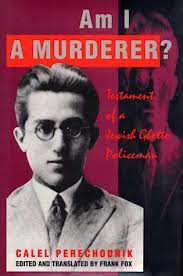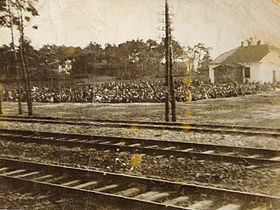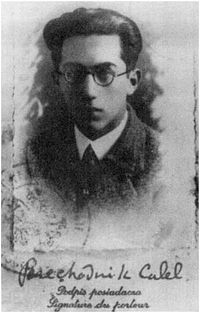One of the Best Holocaust Memoirs
June 18, 2015

"Am I a Murderer?" by Calel Perechodnik
Until his death in 1944 at age 27, Calel Perechodnik was wracked with guilt. As a member of the Jewish Police in the Otwock, he was tricked into putting his own wife and child on a train to Treblinka. He never saw them again.
He did not realize that, as Revisionists claim, Treblinka was a country club, and his wife and child were too busy enjoying the many amenities to write. (I am being sarcastic.) His book, "Am I a Murderer?" is the eloquent testimony of an intelligent young man caught in a maelstrom like so many.
A secular Jew, Perechodnik was born in 1916 to an Orthodox Jewish family in Otwock, southeast of Warsaw. He earned a degree in agronomy. Perechodnik's wife Anka (Chana) née Nusfeld, ran a cinema named Oasis with her two brothers. Calel and Anka's only daughter Alinka (Athalie), was born on 19 August 1940, a year after the German invasion of Poland.
Makow Comment: We are all sickened by the way Zionists continue to exploit the Jewish holocaust which they were partly responsible for. But that should not prevent us from honoring its victims, as well as the 60 million Gentiles who were the real target of the genocide that was World War Two. Most of the Jewish victims were not a conscious part of a Jewish Conspiracy. They were normal human beings like you and I. Calel Perodchodnik "became very bitter toward the Jews and frequently criticized them, even blaming them for bringing these events on themselves because of their insistence on cultural and religious isolation."
I read this book a few years ago. Two of Perechodnik's anecdotes have stuck in my mind.
1. After the Nazi and Russian invasions, two trains carrying Jews pulled into a small-town station, one going east, the other west. The passengers tried to convince their opposite numbers that safety lay in the direction they were going.
2. Jews were being shot in a pit. When their turn came, two teenage sisters joined hands and skipped over to the burial site in a carefree dance, lying down with dignity to receive a fatal bullet.
We didn't ask to be born. We didn't ask to endure the obstacle course that is life. But here we are, all in the same boat. Let's be kind to each other
from June 18, 2015
(abridged by henrymakow.com)
In 1940, Calel Perechodnik and his family, along with the 8,000 other Jews of Otwock, were forced to relocate to the Otwock Ghetto. To provide for himself, his wife, and their daughter, in February 1941 Perechodnik joined the Jewish Ghetto Police organized by the Judenrat on German orders.

(Clandestine photo showing layover yard in Otwock on 19 September 1942. In the distance, Jews sit on the ground overnight, while awaiting transport to Treblinka extermination camp.)
In early 1942, the German authorities began the Ghetto liquidation action. The Jewish police were ordered to assist in the rounding up of Jews who were taken to the station and loaded on freight trains heading for the Treblinka extermination camp. Assured by the commandant of the Ghetto Police that his family would be protected, on 19 September 1942, Perechodnik brought his own wife and daughter to the ghetto's main square.
But he was betrayed: Anka and Alinka were among the 8,000 Otwock Jews sent to their deaths at Treblinka. Subsequently, he was sent to a labour camp. Perechodnik constantly blamed himself for the death of his wife and daughter. Prior to their shipping to Treblinka, Anka asked Calek on several occasions to obtain a false kennkarte for her, identifying her as an ethnic Pole since she did not have the typical Jewish looks. Calel later wrote that she could easily pass for a Pole if she dyed her hair. Perechodnik failed to obtain the kennkarte for his wife in time, partly due to his laziness and partly due to his "lack of trust in such things".
IN HIDING
On 20 August 1942, Calel Perechodnik escaped to Warsaw. His father, Aryan in appearance, remained at large to support the family until he was captured by the Gestapo and executed. Calel spent 105 days in hiding with his mother and other Jews in the apartment of a Polish woman risking her own life to save them. While in hiding, he spent the time writing. The last entry in his memoir concerns his last will and is dated 23 October 1943. He then joined the Polish Underground; it was during this time that he contracted typhus.
On 1 August 1944, the Warsaw Uprising began as part of a nationwide Operation Tempest. Perechodnik participated in the uprising as part of the Chrobry II Battallion. There are several theories as to how he died. One states that he committed suicide by swallowing cyanide after the Uprising failed. Another claims that he was killed by pillagers after the uprising. Another account (stated in the letter of Henryk Romanowski to his brother Pesach Perechodnik, following the memoirs in the book) claims he was burned alive in the bunker, unable to get out because of the typhus. He was aged 27.
AM I A MURDERER?
The Jewish Ghetto Police which he joined, was not a benevolent force by any means. Emanuel Ringelblum referred to it as 'the direct instrument of extermination'. One of the first clandestine operations of the Jewish Combat Organization (ŻOB) in Warsaw, was to assassinate its commanders. Perechodnik's account, therefore, needs to be seen in its proper perspective. His memoir describes such events as his and his father's compliance with the Polish radio broadcast command to go eastward to fight in 1939, the formation of the Judenrat in Otwock, Himmler's visit to Warsaw, the death of Czerniakow, the rounding up of Jews in the ghettos; life in, and escape from, a work camp; the experience of being hidden in Warsaw, the beginning of understanding of what was happening in the death camps, the 1943 Warsaw Ghetto Uprising, and the 1944 Warsaw Uprising.

His information is now considered by various researchers and experts on the Holocaust to be remarkably accurate, and according to these researchers, the notes show proof that the Jews at that time knew what was happening. Perechodnik wrote his memoir between 7 May and 19 August 1943 in Warsaw, during his stay at the home of his Polish rescuer. When describing the German occupation of Poland he attempts to explain his own actions which were inspired by fear, but also, blames the Jews for claiming to have been a chosen people, thus encouraging anti-Semitism among the gentile population.
He expresses his outrage at the refusal by some Orthodox Jews to sent their children to Polish orphanages which would have saved them from the Holocaust. Perechodnik expressed his anguish and astonishment at the savagery of war. It was, he wrote, 'he greatest disillusionment that I have endured in my life.' Shortly before Perechodnik died in 1944, he entrusted his manuscript to a Polish friend.
In his final years, Perechodnik completely changed his attitude towards the Jews and the Jewish faith and traditions. In his memoir, he rejected belief in God and the religious traditions of his Orthodox Jewish family. He became very bitter toward the Jews and frequently criticized them, even blaming them for bringing these events on themselves because of their insistence on cultural and religious isolation. He was sarcastic about others, as well as self-deprecating about his own Jewishness.
-----







Dan said (June 19, 2015):
I haven't read the book, though from researching it today I think I should. I can find no challenge of it's authenticity by any revisionist. I think it's probably a 'must read' for anyone who really wants to understand the variety of perceptions of 'the Jewish Problem' of Europe by Jews themselves who lived in those now infamous places and times.
Everybody reads autobiographies through personal 'lenses', so to speak. Someone that's gotten the idea somewhere that the big camps were all manufacturing centers, and small ones like Treblinka were 'transit centers' will probably feel a lot of dissonance reading this book. Conversation on Treblinka has been especially divisive. However, it could be a lot less divisive if people that comment about it would read each other's supporting material before picking a position, but most people tend to pick a position that's not dissonant with they want to believe